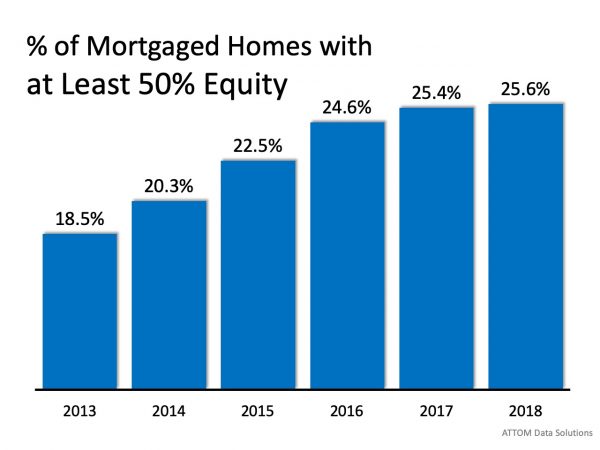
“When you own your home, your housing expense (the mortgage payment) comes back to you in the form of equity in your home.”
One of the benefits of homeownership is that it is a “forced savings plan.” Here’s how it works: You make a mortgage payment each month. Part of that payment is applied to the principal balance of your mortgage. Each month you owe less on the home. The difference between the value of the home and what you owe is called equity.
If your home has appreciated since the time you purchased it, that increase in value also raises your equity. Over time, the equity in your home could be substantial. Recently, CoreLogic revealed that the average homeowner gained more than $65,000 in equity over the last 5 years.
Unlike last decade, homeowners are no longer foolishly tapping into that equity. In 2006-2008, many owners used their homes like an ATM by pulling equity out to purchase new cars, jet skis, or lavish vacations. They were pulling out cash (equity) from an appreciating asset, and then spending it on rapidly depreciating items. That is not happening anymore.
Over 50% of Homes Have at Least 50% Equity
The number of homeowners that currently have at least 50% equity in their home is astonishing. According to the Urban Institute, 37.1% of all homes in the country are mortgage-free. In a home equity study, ATTOM Data Solutions revealed that of the 62.9% of homes with a mortgage, 25.6% have at least 50% equity. That number has been increasing over the last five years: By doing a little math, we can see that 53.2% of all homes in this country have at least 50% equity right now. Of all homes, 37.1% are mortgage-free and an additional 16.1% with a mortgage have at least 50% equity.
By doing a little math, we can see that 53.2% of all homes in this country have at least 50% equity right now. Of all homes, 37.1% are mortgage-free and an additional 16.1% with a mortgage have at least 50% equity.
Bottom Line
Homeownership is different than renting. When you own, your housing expense (the mortgage payment) comes back to you in the form of equity in your home. That doesn’t happen with your rent payment. Your rent helps build your landlord’s equity instead.
To view original article, visit Keeping Current Matters.
How Long Will It Take to Sell Your House?
If you’re looking for ways to make your move happen as quickly as possible, partnering with a great local agent is the key.
Why Did More People Decide To Sell Their Homes Recently?
As rates came down at the end of the summer, more people jumped into the market and decided to make their move.
Planning To Sell Your House in 2025? Start Prepping Now
By starting your prep work early, you’ll give yourself plenty of time to get your house market-ready by the end of the year.
Why an Agent Is Essential When Buying a Newly Built Home
By working with a knowledgeable real estate agent, you can feel confident when buying a newly built home today.
What To Expect from Mortgage Rates and Home Prices in 2025
With home prices projected to rise at a more moderate pace, 2025 is shaping up to be a more promising year for both buyers and sellers.
Why Now’s Not the Time To Take Your House Off the Market
By keeping your home on the market, you increase the chances of attracting people who are truly ready to make a purchase.







.jpg )
